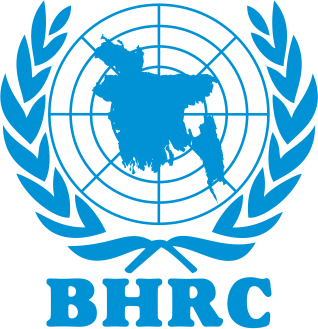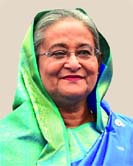

|
EDITOR
|
Editorial
‘Fortnightly’
পাক্ষিক |
|
|
Sheikh Hasina's UN Speech: Solution to Rohingya Crisis

Human Rights Report
Prime Minister Sheikh Hasina has called upon the
United Nations and the international community to
take immediate and effective measures for a
permanent solution to the Rohingya crisis. She came
up with the call while addressing the 72nd session
of the UN General Assembly on September 22.
"Myanmar must unconditionally stop the violence and
the practice of ethnic cleansing in the Rakhine
immediately and forever," she said in the first
proposal.
UN Secretary-General should immediately send a
fact-finding mission to Myanmar, she said in her
second proposal. "All civilians irrespective of
religion and ethnicity must be protected in Myanmar.
For that, 'safe zones' could be created inside
Myanmar under UN supervision," was her third
proposal. Sheikh Hasina in her fourth proposal
called for ensuring return of all the
forcibly-displaced Rohingyas in Bangladesh to their
homes in Myanmar.
In her last proposal, she said the recommendations
of the Kofi Annan Commission Report must be
immediately implemented unconditionally and in its
entirety. Prime Minister Sheikh Hasina said, this
was the 14th time she was addressing the UN General
Assembly and this time she has come with a heavy
heart. "I've come here just after seeing the hungry,
distressed and hopeless Rohingyas from Myanmar who
have taken shelter in Cox's Bazar, Bangladesh..
.
IHRC North Indian Regional Human Rights Conference in Kharagpur
Human Rights Report:
International Human Rights
Commission-IHRC North Indian Regional Charpter
Organized a regional human rights conference on 11th
July 2017 at Kharagpur (South of West Bangal &
border of Orrisha state) India. Dr.M.Arshad vice
president of IHRC presided over the conference.
Internatoonal Secretary General of IHRC Dr.Saiful
l.Dildar inagurated this conference as a Chief
Guest. Different state representative of IHRC like
west Bengal, Orissha,
Telenga,Karnetak,Kerela,Jharkhand, Rajasthan and
Maharastra representative presented this conference.
North Indian Regional Chapter General Secretary
Mr.Aynul Hossain, Advocate Shapna Basu (Khandakar)
president of IHRC WB Chapter and Suranjit Kormokar
General Secretary IHRC West Bangal charpter, Shekh
Gaush President of Telenga State,Girish Bora Legal
Advicer of IHRC and NIC,Swapan Kr. Bhatachary Vice
President of IHRC, A.D.Burman member of IHRC and NIC.
Reknowned Lawyer and President of BHRC Kurigram
District branch Abraham Lincon, BHRC Feni Dist.
President Shahidullah Bhuiyan including over 25
human rights Leaders has also given their speech
this conference . Hundreds of Human Rights Activists
from India and Bangladesh presented this
conference.Over 30 Human Rights Activists also
achieved the human Rights award. A Cultural program
organised and childrens also performed there.
The need for
discipline on our roads
Human Rights Report:
here is and has always been a paramount need for
discipline on city roads. Dhaka is certainly among
those rare number of cities in the world where an
absolutely carefree attitude to behaviour on the
roads, both by pedestrians and motorists, is in
fashion. Surprisingly, those whose responsibility it
is to enforce the rules on the road, and we refer to
the traffic policemen on duty, seem to be
indifferent to the whole idea. Of course, in fits
and starts the police get to work on the issue,
particularly when a police week or something similar
happens to come up. Again, during VIP movements, an
overzealous police force gets to work, to a point
where people are not even allowed to walk on the
pavements. Everything must come to a stop when a VIP
goes by.
Overall, though, the problem of how we as citizens
use our roads is a critical one. Pedestrians are
simply not bothered about rules. The presence of
overhead foot bridges to facilitate pedestrian
movement is ignored and people cheerfully indulge in
jaywalking, often in full view of traffic sergeants
and constables. Such conditions are fraught with
risks, but does the pedestrian care? As if that were
not enough, there are the drivers, of all kinds of
vehicles, who appear to have decided that violating
traffic rules is fine in a country where powerful
and influential people often skirt around the law to
achieve their nefarious aims. Vehicles come to a
stop on zebra crossings, forcing people to cross
over to the other side in slithering, snake-like
manner. At the same time, the arrogance-laden
impunity with which drivers change lanes in order to
overtake one another on the road is behaviour which
shows no signs of abating. Add to that the brazen
manner in which motor-cyclists happily go by without
their helmets on and often have their two-wheelers
climb on to pavements in order to beat the bad
traffic on the road. Not long ago, the High Court
issued an order prohibiting motor-cyclists from
having their vehicles use pavements. No one has
followed that directive.
Indeed, there are reasons to think that as a
society, insofar as road traffic is concerned, we
are reverting to old times when traffic was
controlled manually by the police. Over the last few
years, that old mechanism has reappeared, even
though the traffic lights are seemingly at work. The
results have been bad.
Thai ex-PM sentenced to five years in jail
Human Rights Report:
Human Rights Report:
Former Thai Prime Minister Yingluck Shinawatra has
been found guilty of criminal negligence and
sentenced in absentia to five years in prison.
The supreme court convicted her of mishandling a
rice subsidy scheme which allegedly cost Thailand at
least $8bn.
Ousted in 2014, weeks before a military coup, and
later impeached, Ms Yingluck denies all charges and
fled before the verdict, reportedly to Dubai.
Public opinion is divided. She remains popular with
rural and poor voters.
The scheme hit Thailand's rice exports, leading to
an estimated loss the military government says was
at least $8bn.
Though popular with her rural voter base, the scheme
was too expensive and open to corruption, her
opponents said.
Where is she?
Ms Yingluck is now thought to be in Dubai where her
brother, former Prime Minister Thaksin Shinawatra,
lives in self-imposed exile avoiding a 2008 sentence
for corruption.
Ms Yingluck entered politics only after his sentence
and was seen by critics as a proxy for her ousted
brother.
Both siblings remain popular among Thailand's rural
poor, but are opposed by an urban and middle-class
elite.
She is unlikely to serve any of her sentence because
she is out of the country.
The trail ran over two years, with a ruling
initially scheduled for late August.
When Ms Yingluck surprisingly failed to show up in
court, the verdict was postponed and an arrest
warrant was issued for her.
Dhaka seeks concrete steps thru' UN for sending back Rohingyas
Human Rights
Report:
Bangladesh expects
concrete steps through the UN Security Council so
that the 'forcibly displaced people from Myanmar' in
Bangladesh can go back to their homeland smoothly
and without any fear.
"...we expect such steps through which they (Rohingyas)
will return to their homeland smoothly," Foreign
Minister AH Mahmood Ali told reporters on Wednesday.
He said the countries which are not members of the
UNSC can also give their speeches in the open debate
of the UNSC on Thursday. UNB reports.
"Bangladesh will also place its remarks (through
envoy) in the debate," he said.
The UN Security Council will meet on Thursday to
discuss the violence in Myanmar and hear a briefing
from UN Secretary-General Antonio Guterres on the
crisis, diplomatic sources said.
Earlier, the Foreign Minister briefed the nine
diplomats stationed in Dhaka representing the
countries which are members of the UN Security
Council over Rohingya issue at the state guesthouse.
The Council is composed of 15 Members with five
permanent members -- China, France, Russian
Federation, the United Kingdom, and the United
States-- and 10 non-permanent members elected for
two-year terms by the General Assembly (with end of
term date).
Apart from the five permanent members, diplomats of
Japan, Italy, Sweden and Egypt attended the
briefing.
State Minister for Foreign M Shahriar Alam and
Foreign Secretary M Shahidul Haque were also
present.
The Foreign Minister said all the countries have
sympathy and support for Bangladesh over the
Rohingya issue.
"Bangladesh wants a peaceful solution. We don't want
to get involved in any conflict," Ali said.
The Foreign Minister also said the State
Counsellor's Office of Myanmar is sending their
minister who wants to meet Prime Minister Sheikh
Hasina.
"You know the Prime Minister is now in the USA," he
said indicating that Bangladesh wants to wait until
the PM's return.
India, China and the United States are 'strongly
with Bangladesh' over Rohingya issue and Myanmar is
now 'absolutely cornered' amid mounting
international pressure on the Southeast Asian
country, says a government source. Bangladesh, at
this point, is expecting a 'concrete steps' through
UNSC resolution to resolve the crisis as 'forcibly
displaced people from Myanmar' continued flooding
Bangladesh as the current figure of new arrivals
stand at 449,000.
"We're working behind the scene. There're signs. We
want to keep up the momentum (in diplomacy) but we
need more time to take the momentum to the next
stage to have concrete outcomes," the highly placed
source said on 26 September.
Drinking 3 cups of coffee a day can cut
risk of death in HIV patients: study
Human Rights Report:
Drinking at least three cups of coffee and not
smoking daily may half the risk of mortality in
patients infected by both human immunodeficiency
virus (HIV) and hepatitis C virus (HCV).
Patients infected by both HIV and HCV are at
specific risk of end-stage liver disease and greater
risk of cardiovascular diseases and cancer.
According to researchers, HIV-HCV co-infected
patients, drinking at least three cups of coffee
each day halved the risk of all-cause mortality.
In the general population, drinking three or more
cups of coffee a day has been found to be associated
with a 14 percent reduction in the risk of all-cause
mortality.
In addition, HIV infection accelerates the
progression of chronic hepatitis C to fibrosis and
development of cirrhosis and end-stage liver
disease.
"This is a very exciting time for HCV research as a
cure that can eradicate the virus is now available
for all patients," explained lead investigator
Dominique Salmon-Ceron from Universite Paris
Descartes, Paris.
Coffee is known to have anti-inflammatory and
liver-protective properties.
This is probably due to the properties of
polyphenols contained in coffee that can protect the
liver and also reduce inflammation.
The team used data from a five-year follow-up of
1,028 HIV-HCV co-infected patients. At enrolment,
one in four patients reported drinking at least
three cups of coffee daily.
Over the five years, 77 deaths occurred, almost half
attributable to hepatitis C.
However, the mortality risk was 80 percent lower in
those who were cured of hepatitis C. Further
analysis showed that drinking at least three cups of
coffee daily was associated with a 50 percent
reduction in mortality risk even after taking into
account HCVclearance, HIV- and HCV-related factors,
and other sociobehavioral factors, such as having a
steady partner and not smoking.
This research highlighted the importance of
behaviors - coffee consumption and not smoking in
particular - on reduced mortality risk.
First author Maria Patrizia Carrieri from Aix
Marseille University, Marseilles, France, observed
that coffee consumption provides more protective
effects on mortality in the HIV-HCV population than
in the general population.
.
.











